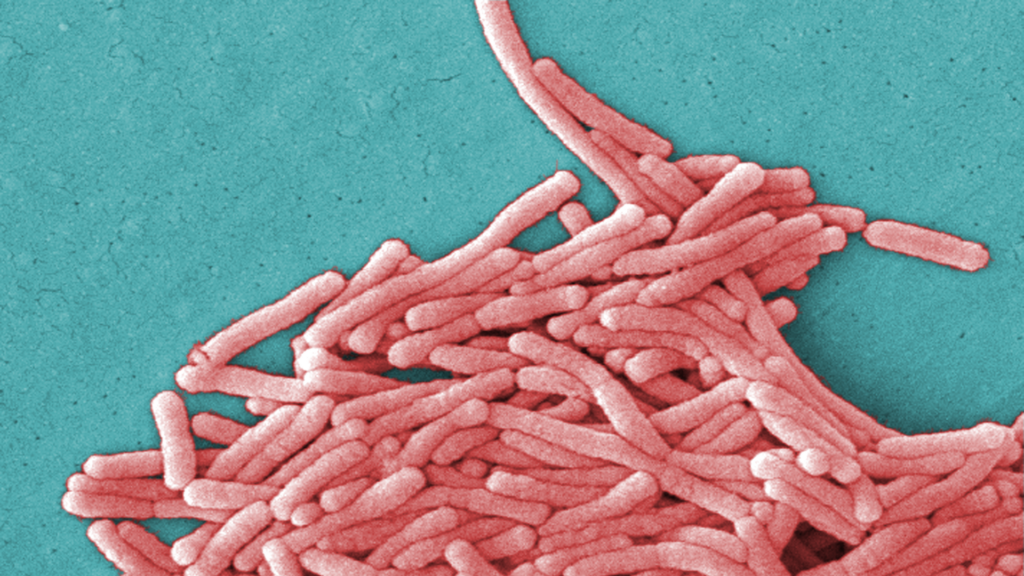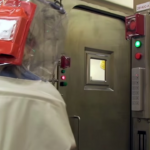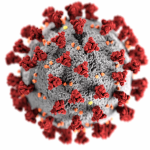Climate or conflict? Legionnaire’s outbreak in Poland raises questions
By Filippa Lentzos, Gemma Bowsher | October 5, 2023
 Legionella pneumophila bacteria, which cause Legionnaire's disease. Credit: CDC/Margaret Williams/Claressa Lucas/Tatiana Travis.
Legionella pneumophila bacteria, which cause Legionnaire's disease. Credit: CDC/Margaret Williams/Claressa Lucas/Tatiana Travis.
An outbreak of Legionnaire’s disease in the Polish city of Rzeszow this summer raised uncomfortable questions for the Polish government about the source of the sometimes-deadly illness that was spreading through the city’s water. The infection, caused by the legionella bacterium, isn’t particularly rare; it crops up all over Europe on occasion, but this outbreak came with a startling statistic—two years’ worth of infections and deaths in just a three-week period. And it happened to occur in a curious location: a key hub for the Western effort to aide Ukraine in its defense against Russia.
It’s generally a good assumption that disease outbreaks are naturally-occurring and not the result of deliberate attempts to create them. Every year, people get sick from bacterial infections like salmonella that can be traced back to a source of contamination or from seasonal viral infections like influenza that happen each year at about the same time. But sometimes, a natural origin shouldn’t be taken for granted. A conflict setting would be one such situation.
That may be particularly true in the context of a war that has included regular rhetoric about biological weapons. Predictions from across civil society have highlighted the potential for Ukrainian public health and biological research efforts to become targets of Russian disinformation. And from the beginning of Russia’s war on Ukraine, Russian officials and media networks have sought to raise unfounded suspicions about illicit activities in Ukrainian biological research labs. Russia has taken its accusations to the UN Security Council and other international fora, so far without success, as it seeks to justify its invasion. The United States, deeply involved in supporting Ukraine, has assessed that Russia maintains an offensive biological weapons program and has raised concerns about whether Moscow might launch an unconventional attack.
For governments, responding assertively to ambiguous outbreaks is critical. They need to move fast to establish the facts and to maintain public confidence in health services. But investigating ambiguous outbreaks is exceptionally difficult. Attributing an outbreak to a source is tricky—technically and diplomatically. Given factors that include climate change and rising global tensions, it’s a task governments may need to confront more frequently.
What happened. A city of about 180,000, Rzeszow is no ordinary Polish town. It sits just 60 kilometers from the Ukrainian border and serves as a major international logistics hub for Western military supplies destined for the conflict. It is a temporary home to roughly 1,700 US troops and is also set to host a NATO-built logistics center within the next year. When Legionnaire’s started spreading, misinformation and disinformation about a deliberate attack or who was to blame spread, too.
Russia’s state-owned RIA Novosti news outlet claimed the Legionnaire’s outbreak may have been a US false flag operation designed to later accuse Russia of using biological weapons. And stopfake.org, a Ukrainian fact-checking organization, reported that Russian state media and anonymous social media channels have worked to pin the blame for the outbreak on Ukrainian refugees in Poland, which plays an important role as the primary receiving nation for Ukrainian refugees. According to the United Nations Human Rights Commission, about 1 million Ukrainian refugees are in Poland.
Polish authorities’ aggressive public health campaign, which included chlorination of the municipal water supply, appears to have contained the disease, which led to 160 cases and 23 deaths between August 18 and September 11. Legionnaire’s is not uncommon, but authorities, reacting to the features and location of the Rzeszow outbreak, set out to investigate whether the outbreak may have been the result of deliberate sabotage.
Security services have remained tight-lipped, saying only that they are carrying out a routine investigation into “potential intentional action,” and the results haven’t yet been made public. Meanwhile, the head of a Polish epidemiology association told The New York Times the evidence likely points to an unusually severe natural outbreak, one that was perhaps amplified by climate change. Hotter temperatures create more favorable conditions for bacterial growth.
Increased ambiguity. The war in Ukraine, the assault on laboratories during Sudan’s recent civil unrest, and earthquakes and floods in Syria, Morocco and Libya, highlight the precarity of biological security amidst the pressing concerns of conflict, climate change, and natural disasters. The Rzeszow outbreak highlights the challenge of a type of event that may become more common.
More disease outbreaks amid global conflicts are a recipe for ambiguous biological events.
Take anthrax—a disease caused by bacterial spores that live in soil and can sicken cattle and other grazing animals who breath in or consume them. It’s endemic in many countries, and small outbreaks are a relatively common feature of the disease landscape. But during a war, tensions and skepticism about the “other side” can run high. When anthrax broke out in goats in a part of Ukraine that didn’t normally see anthrax infections, the incident demanded a heightened public health and communications response.
This altered risk landscape is certainly what raised the Polish Legionnaire’s outbreak to an issue of international note. As a NATO member, Poland is a highly sensitive location for any allegations of deliberate unconventional weapon use, which, if proven, would in all likelihood trigger some sort of response by the Western alliance. The Polish government recognized this outbreak as a chance to demonstrate itself as a credible actor at the nexus of converging biological and security threats and was able, it appears, to deliver an effective response.
International action. Assertive action from Poland appears to have contained both the epidemiological and security harms up to this point. But resources needed for such a response may not always be available in other areas of the world. The lack of robust platforms to address the risks of ambiguous biological events in less-developed locations remains a gap in global health security.
In high-level international bodies—including the Biological Weapons Convention (BWC), the UN General Assembly, and the governing body of the WHO—there are calls to strengthen international mechanisms to attribute alleged deliberate biological events to their sources. Although procedures exist within the bioweapons treaty for holding multilateral meetings to air allegations and evidence regarding treaty violations and for lodging complaints with the UN Security Council, no international investigation or attribution process has ever been launched under these auspices. The WHO’s lack of formal authority to investigate ambiguous disease outbreaks has been critiqued throughout the COVID-19 origins debates, and it remains a contentious issue within ongoing negotiations over a Pandemic Accord to improve the global response to disease threats.
Proposals for improving attribution approaches have included strengthening the capacities of the UN secretary-general to investigate allegations of biological weapons use, which are mandated directly by the UN General Assembly and sit outside of the Biological Weapons Convention. Other propositions emphasize the role of the WHO in acting as the focal point for investigations of disease events with unclear origins.
Ambiguous biological events span the domains of public health and biosecurity by invoking the overlapping international architectures of peace and war. As the global biorisk landscape evolves and security dynamics increasingly interface with the day-to-day work of public health, the need to strengthen international mechanisms to address ambiguous biological events is growing stronger.
Together, we make the world safer.
The Bulletin elevates expert voices above the noise. But as an independent nonprofit organization, our operations depend on the support of readers like you. Help us continue to deliver quality journalism that holds leaders accountable. Your support of our work at any level is important. In return, we promise our coverage will be understandable, influential, vigilant, solution-oriented, and fair-minded. Together we can make a difference.
Keywords: biological weapons, outbreaks
Topics: Biosecurity















